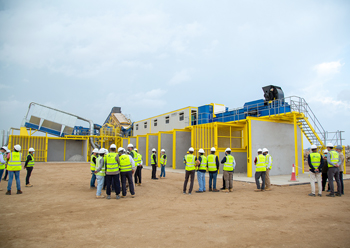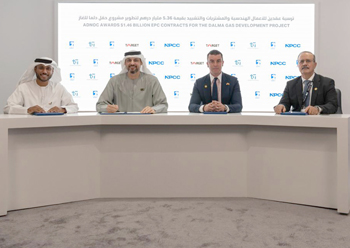
 Averda’s waste management services included the large-scale recycling of construction and demolition wastes.
Averda’s waste management services included the large-scale recycling of construction and demolition wastes.
Averda secures new Red Sea Project work
Averda, the international waste and recycling company, has announced that it has been awarded a contract to work on the next phase of the prestigious Red Sea Project in Saudi Arabia.
For the past two years, Averda has been providing end-to-end, sustainable waste management services to The Red Sea Development Company (TRSDC) for the initial construction phase of the project and, following successful delivery, has been awarded a further contract for the next phase.
Under the terms of the contract – which is signed with Sepco III – Averda will provide an integrated waste management facility for The Red Sea Project site, which will have the capacity to sustainably treat waste from residents, employees and visitors to this exclusive tourism destination.
Averda will also be responsible for providing equipment and waste collection vehicles to operate on land and sea across the whole site.
During the initial construction phase, Averda’s waste management services also included the large-scale recycling of all building, construction and demolition waste, as well as municipal waste.
In the next phase, during which guests will start to enjoy the facilities, the focus will shift to reducing and recovering household and general waste whilst maintaining the policy of ‘zero waste to landfill’.
Facilities provided by Averda will include a new automated Materials Recovery Facility (MRF), a novel incinerator and an innovative composting system. The commitment to sustainability is reflected in the choice of electric vehicles to be used for waste collection and transportation at The Red Sea Project. These include an electric refuse collection truck (in place of traditional diesel-fuelled vehicle), electric tippers and even an electric boat to service the islands which form part of this coastal development. The electricity used to power this electric fleet will be generated by solar panels.
Engie Solutions achieves major GCC construction milestone
Engie Solutions, an international leader in sustainable energy solutions, has achieved an outstanding 20 million person-hours without a lost time incident (LTI) over a period of 900 days across its GCC operations.
This accomplishment is a valuable testament to the company’s values and positions Engie Solutions as an industry trailblazer in employee health, safety and wellbeing, says statement from Engie Solutions.
The 20 million person-hours without a LTI marks a new milestone by Engie Solutions, surpassing the previous mark of 10 million lost time incident-free work hours achieved last year.
“Safety of our employees is always a top priority for Engie Solutions,” says Miles Webb, the Chief Operations Officer. “Achieving 20 million person-hours without a lost time incident is an important milestone for us underpinned by various factors such as organisational culture, having effective and efficient processes in place, leadership commitment, employee engagement, not to mention a predisposition towards risk anticipation and mitigation,” he states.
According to him, Engie embraces the highest standards of health, safety and security for all employees, with the protection of individuals deeply embedded within the company’s DNA.
Through its ‘No Life at Risk’ framework, the company seeks to reduce the frequency and severity of accidents for its own employees and any subcontractor partners, with a target of zero fatal accidents, states Webb.
Egis ties up with Israeli group to set up rail cybersecurity centre
Egis, a leading global player in the construction engineering and mobility services sectors, has joined hands with Israeli rail cybersecurity specialist Cylus to deliver the first Rail Security Operations Centre (SOC) through their joint cybersecurity Center of Excellence which opened in 2020.
A SOC provides round the clock cybersecurity services to monitor, detect, identify, and respond to impending threats. The proposed SOC, by Egis and Cylus, will be the first to combine both IT and OT (operational technology) security services in the rail and urban transit sector.
The heart of the SOC will be CylusOne, a revolutionary feat of engineering and artificial intelligence, delivering a real-time analysis of communications between critical systems and network interfaces –designed specifically for the rail industry.
The SOC will be operated by a team of security experts on a rota to ensure 24/7/365 availability.
Egis and Cylus expect the global-first rail SOC to be operational by January next year. The main SOC premises will be strategically located in Indian city of Mumbai and will be available to rail and urban transit customers globally.

















.jpg)













 (1).jpg)














































